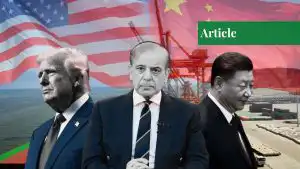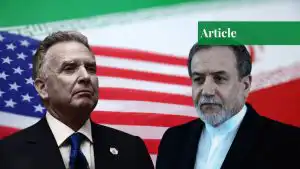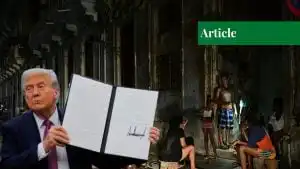Introduction
The 1970s petrodollar agreement between the US and Saudi Arabia holds significant historical importance. US dollars exchanged for oil/crude oil products are known as “petrodollars.”
The famous Yom Kippur War, also known as the Arab-Israel War of 1973, not only came with drastic geopolitical shifts, but it also came with the 1973 oil embargo on the US against its support for Israel. The embargo was imposed by the Organization of Petroleum Exporting Countries (OPEC). Due to this, oil prices per barrel surged, eventually resulting in public dissatisfaction and inflation. The submissive attitude of the US towards Saudi Arabia showed the changing dynamics of world order. Such geopolitical events hold the power to shift the world order from unipolar to multipolar.
The 1973 Oil Crisis
During the 1973 Arab-Israel War, also known as the Yom Kippur War, OPEC imposed an oil embargo against the states that were supporting Israel, including South Africa, Netherlands, and Portugal. The support of the US for Israel costs a lot.
The embargo included a cut on oil production as well as a ban on exports of petroleum commodities. It eventually resulted in severe consequences for the US, which was completely dependent upon the exports of foreign oil. The world witnessed a massive surge in the prices of oil barrels. With the increase in oil prices, everything became expensive. The day-by-day inflation not only impacted the US economy but also had a severe impact on its social fabric. The rising inflation was a source of great discomfort that eventually resulted in anger and frustration among the general public.
A full stop to the embargo was the need of the hour for the US, but the only demand of the Arab states that stood in the way was to amicably and efficiently resolve the conflict between the two conflicting states. The crisis proved to be a major challenge for the US foreign policy, particularly in balancing their relationship with Israel and also coming to terms with the Arab states.
What Does the Deal Entail?
During Richard Nixon’s administration, the agreement was amicably signed on 8th June 1974. The two key officials who signed the contract were Henry Kissinger—the US Secretary of State, and the Saudi Prince Fahd bin Abdulaziz.
The contract proved to be instrumental in establishing stronger economic and military cooperation between the two states. The two striking points of the deal included the usage of dollars exclusively when exporting oil to other countries which would eventually result in solidifying the dollar in the global market, making it the only global currency for oil dealings. The second condition was that in exchange for dollar transactions, the US approved the provision of advanced military equipment to Saudi Arabia—making this deal beneficial for both parties.
The petrodollar agreement paved the way for new economic and military cooperation between the two states. In addition to making the dollar an international currency, Saudi Arabia also benefited greatly from this agreement.
Impacts
“Petrodollar recycling” is a well-known phenomenon where Arab countries—who are part of the OPEC arrangement—usually invest their surplus dollars in US real estate schemes, bonds, and treasuries. Since the dollar is an international currency, widely used in every trade transaction, there is always a dollar surplus. The investment of the OPEC countries in the US economy shows a major impact on the American financial market. Apart from having a strong hold on the global financial market, it helped the US stabilize its currency.
Current Position of the Deal
On 9 June 2024, Saudi Arabia announced its disassociation with the petrodollar deal. This step can prove to be a fatal blow to the US economy as it can take the world towards the path of de-dollarization.
The sole reason that Saudi Arabia made this decision was because it wanted to entertain other countries in the global market as well, such as China. Variation in Saudia’s economy is the need of the hour; hence, the decision. It was also made in light of the diversification of Saudia’s economic ties with other countries, namely China. To quote an instance, Saudi Arabia now can easily make payments in Yuan to China in exchange for oil exports.
Saudi Arabia has also recently joined BRICS. Since BRICS is a huge advocate of using local currency, Saudia’s inclusion in the organization and its decision to discontinue the petrodollar deal indicates that the world is moving towards multilateral relations.
US-Saudi Arabia Relations
US-Saudi Arabia relations go way back to the 1930s. Both countries have mutual energy, military, and monetary interests. Saudi Arabia is one of the biggest foreign military sales customers with more than 100 billion dollars of FMS sales. Despite closer ties, the oil embargo in the ’70s put a halt to their budding friendship, to remedy this—the petrodollar agreement was made.
For 50 years, both states enjoyed various perks of the deal, but its discontinuation will surely result in tensions between the two states.
The reserves of dollars in the central banks have shown a massive reduction of 70% reserves to 55% last year. These statistics show the rapid decline of the dollar in the global market due to the now-ceased deal.
Conclusion
The US-Saudia relations are one of the most strategically strong bilateral relations in the world, secured with mutual interests. The US-Saudi Arabia petrodollar agreement proved to be pivotal in shaping the global financial markets as it not only helped Saudi Arabia’s security structure but also helped the US maintain the hegemony of the US dollar in the global market. The recent suspension indicates how a single agreement has the power to jolt the financial market.
With its suspension, Saudi Arabia will enjoy the diversification of its economy, but the world will witness a slow decline in the popularity of the dollar. The decline in the dollar will give rise to a new multipolar economic order where, apart from dollars, multiple currencies will have a stronger footing in the financial market. Saudi Arabia is an important US partner. Terminating the agreement might dent their relations, but it will not completely tarnish the geostrategic interests they shared. Both countries will continue to work together despite any ensuing issues.
If you want to submit your articles and/or research papers, please check the Submissions page.
The views and opinions expressed in this article/paper are the author’s own and do not necessarily reflect the editorial position of Paradigm Shift.
Minahil Baig is currently pursuing her master's degree in Peace and Conflict Studies from NUST. Her areas of interest include conflict management, defence studies, artificial intelligence, and modern warfare.





